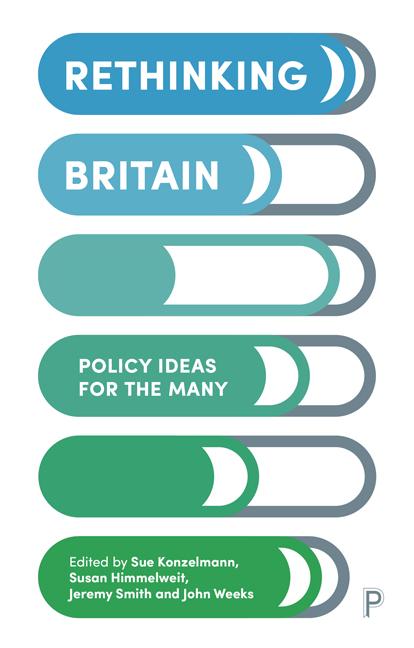Book contents
- Frontmatter
- Contents
- List of Tables and Figures
- The Contributors
- Foreword
- Introduction
- Interlude: ‘Mirror, Mirror, On the Wall – Who has the Highest Debt of All?’
- Part One Building a Full-Employment Economy: Introduction
- Part Two Public Investment – Prioritising Society Rather than Profit: Introduction
- Part Three Making Finance Work for Society: Introduction
- Part Four Genuine Social Security: Introduction
- Part Five How to provide for Social Needs: Introduction
- Conclusion
- Jargon Busters
- References and Further Reading
- Index
7 - Would Universal Basic Income (UBI) Address the Causes of Inequality, Ill-Being and Injustice?
Published online by Cambridge University Press: 11 March 2021
- Frontmatter
- Contents
- List of Tables and Figures
- The Contributors
- Foreword
- Introduction
- Interlude: ‘Mirror, Mirror, On the Wall – Who has the Highest Debt of All?’
- Part One Building a Full-Employment Economy: Introduction
- Part Two Public Investment – Prioritising Society Rather than Profit: Introduction
- Part Three Making Finance Work for Society: Introduction
- Part Four Genuine Social Security: Introduction
- Part Five How to provide for Social Needs: Introduction
- Conclusion
- Jargon Busters
- References and Further Reading
- Index
Summary
What's the issue?
This policy idea evaluates Universal Basic Income (UBI) as a solution to the problems of the modern welfare state and its social protection system.
Could a feasible Universal Basic Income (UBI) payment successfully replace a substantial part of the welfare system?
Analysis
The British welfare state is an evolving institutional complex comprising state programmes in cash and in kind, such as public services, a tax system, numerous forms of intervention in the labour market and public regulation of enterprises, households and other actors. Public expenditure on the welfare state amounts to about £700 billion, 26 per cent of GDP. Of this £700 billion, about one-half comprises cash transfers to households. The remaining half comprises direct government spending on health and education, personal social services, housing etc, including a rapidly growing proportion on contracted-out services and quasi-markets.
The welfare state has been subject to four decades of cuts, privatisation and restructuring with overtly regressive goals. Despite these obstacles and attacks, the welfare system persists and continues to pursue progressive goals, citizenship needs and rights rather than private interests, as illustrated in Table 1.
Reform is no simple task. In the last few years there has been a groundswell of support in the labour movement and the green movement for a single radical reform, a Universal Basic Income (UBI) or Citizen's Income, an unconditional payment made to every individual as a right of citizenship. It could be paid to everyone on a monthly basis and aim to provide ‘a basic amount on which every citizen can survive, excluding housing and any extra costs for disability living’.
See ‘Investing in social infrastructure’ (Part Two, Policy idea 6), for further discussion of what constitutes ‘investment’ and ‘infrastructure’.
Arguments for UBI
The most important claims in favour of UBI are as follows. First, UBI would provide more freedom of choice, a better work–life balance, enhancement of gender equality and expand choices between paid and unpaid work. Second, it would provide a solution to the mass unemployment that many argue will result from automation. Third, it would reduce the employment insecurity of young people. Fourth, a universal minimum would overcome the problem of losing benefits when taking on or increasing employment.
- Type
- Chapter
- Information
- Rethinking BritainPolicy Ideas for the Many, pp. 173 - 177Publisher: Bristol University PressPrint publication year: 2019

